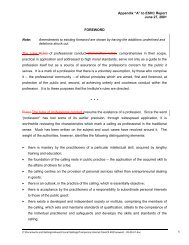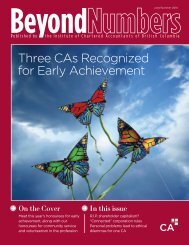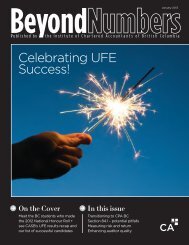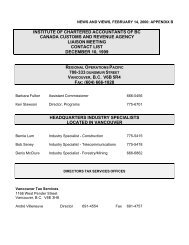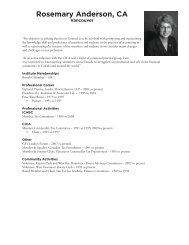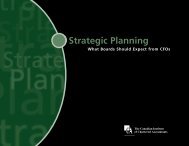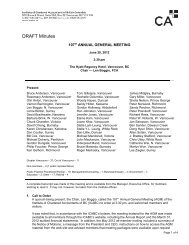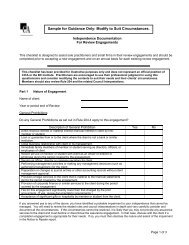ICABC Awards for Early Achievement - Institute of Chartered ...
ICABC Awards for Early Achievement - Institute of Chartered ...
ICABC Awards for Early Achievement - Institute of Chartered ...
Create successful ePaper yourself
Turn your PDF publications into a flip-book with our unique Google optimized e-Paper software.
The cost <strong>of</strong> acquiring <strong>of</strong>fsets andallowancesA business may also reduce its GHG emissionsby:• Acquiring an emission allowance within acap-and-trade system;• Directly funding a carbon reduction projectwith a project developer; and/or• Acquiring a carbon reduction or <strong>of</strong>fset creditfrom a trader (this may include the BCgovernment’s new Pacific Carbon Trust, 2 whichis expected to sell <strong>of</strong>fset credits to the public).With regard to the tax treatment <strong>for</strong> the cost <strong>of</strong>carbon reduction or <strong>of</strong>fset credits, the CRA hasstated that while credits purchased in one yearmay be applied against a taxpayer’s emissionreductions in a future year, the costs <strong>of</strong> acquiringcredits should be included in the cost <strong>of</strong> goodsproduced by the taxpayer, where it can be shownthat the credits can only be used once and thecosts incurred are related to the cost <strong>of</strong> producingthe taxpayer’s products in the year. Consequently,a portion <strong>of</strong> the acquisition cost <strong>of</strong> a creditwould be deducted in the year as cost <strong>of</strong> goodssold, while any balance relating to unsoldproducts would be included in the cost <strong>of</strong> inventorieson hand. Otherwise, the cost <strong>of</strong> acquiringcredits would generally be deductible in thetaxation year in which it applies.In addition, the CRA has noted that the costs<strong>of</strong> acquiring credits may be considered “capital”in nature, rather than current. It has stipulatedthat in cases where credits are granted indefinitelyor <strong>for</strong> a number <strong>of</strong> years and may notbe carried <strong>for</strong>ward, any capital costs shouldrepresent either an eligible capital property(indefinite life) or the cost <strong>of</strong> a depreciable propertyincluded in Class 14 (fixed term), to beamortized <strong>for</strong> tax purposes over future years.Ultimately, the facts <strong>of</strong> each situation willdetermine whether the purchase <strong>of</strong> carboncredits is considered capital or current in nature,and in which period they should be deducted.Treatment <strong>of</strong> GHG reductionproject receiptsA company may find that parts <strong>of</strong> its regularbusiness operations generate carbon or emission<strong>of</strong>fsets, which could be validated by a qualifiedpr<strong>of</strong>essional and sold to a purchaser. In BC, inaddition to private project developers and <strong>of</strong>fsettraders, such purchasers now include the provincialgovernment’s Pacific Carbon Trust. Regulationsenacted by the province in December 2008 setout requirements <strong>for</strong> GHG reduction projectsthat could be recognized as <strong>of</strong>ficial emission<strong>of</strong>fsets in fulfilling the BC government’s commitmentto a carbon-neutral public sector by2010. Since early 2009, the Pacific CarbonTrust has begun to actively fund <strong>of</strong>fset projectsthroughout the province.When it comes to the tax treatment <strong>of</strong> theproceeds received from carbon <strong>of</strong>fset sales, areview <strong>of</strong> all the relevant contractual documentsand circumstances is required. Those conductingthe review should consider the tax treatment <strong>of</strong>the original expenditures relating to the project.For example, a farmer may adopt a new practice<strong>of</strong> direct seeding, which may qualify as an <strong>of</strong>fsetproject and generate carbon <strong>of</strong>fset revenue fromthe purchaser (e.g. the Pacific Carbon Trust).This incidental revenue will likely constituteincome from the farmer’s farm business.In another example, during the course <strong>of</strong>business, an organization may consider replacingan old steam turbine engine with the latestenergy-efficient model in a project that mayqualify as a GHG reduction project or <strong>of</strong>fset. Tothe extent that carbon <strong>of</strong>fset proceeds may berealized in respect <strong>of</strong> the cost <strong>of</strong> acquiring thisnew depreciable property, the proceeds mayconstitute a receipt that is eligible, depending onthe circumstances, to reduce the capital cost <strong>of</strong>the depreciable asset acquired.Finally, the treatment <strong>of</strong> proceeds from thesale <strong>of</strong> <strong>of</strong>fset credits or allowances previouslyacquired from third parties again depends on thecircumstances—including the treatment <strong>of</strong> theacquisition costs and whether or not the creditswere acquired as part <strong>of</strong> regular business operations.Preparing <strong>for</strong> changeGHG emission regulations have now beenenacted in BC, and further provincial, federal,and international regulatory developments areexpected in the near future. In the meantime,BC businesses will continue to identify incentivesand pursue ways to voluntarily reduce theircarbon footprints.A critical first step in establishing operationaland tax strategies involving carbon reductionis to identify and measure baseline emissions,existing projects that may qualify as <strong>of</strong>fsets, andfuture emission reduction opportunities. A carbonadvisory specialist who understands not only theGHG-related issues but also the tax implications<strong>of</strong> the various alternatives can prove to beinvaluable in helping to prioritize a company’soptions and develop a comprehensive greenbusiness strategy.George Kondopulos, CA, is a senior tax managerwith KPMG LLP in Vancouver, and a member<strong>of</strong> the firm’s growing Carbon Advisory Group,advising BC businesses on green energy, cleantechnology, carbon regulation, and sustainablebusiness practices.DisclaimerKPMG LLP states that the in<strong>for</strong>mation containedherein is current to April 30, 2009, and is <strong>of</strong> ageneral nature that is not intended to address thecircumstances <strong>of</strong> any one particular individual orentity. Although KPMG LLP endeavours toprovide accurate and timely in<strong>for</strong>mation, there canbe no guarantee that the in<strong>for</strong>mation is accurate as<strong>of</strong> the date it is received, or that it will remainaccurate in the future. Readers should not act onsuch in<strong>for</strong>mation without appropriate pr<strong>of</strong>essionaladvice and a thorough examination <strong>of</strong> the particularsituation.2The Pacific Carbon Trust is a BC Crown corporation established to deliver carbon <strong>of</strong>fsets to help organizations and individuals meet their carbon reductiongoals. The BC government and other public sector organizations will be required to purchase carbon <strong>of</strong>fsets from the Trust by 2010 to achieve carbonneutrality. It is also anticipated that the Trust will make carbon <strong>of</strong>fsets available <strong>for</strong> sale to businesses and individuals interested in reducing their carbonfootprints. To meet the demand <strong>for</strong> carbon <strong>of</strong>fsets, the Trust purchases <strong>of</strong>fsets from eligible BC-based projects that reduce or <strong>of</strong>fset GHG emissions.24 ica.bc.ca June/Summer ’09



